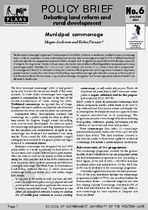| dc.contributor.author | Anderson, Megan | |
| dc.contributor.author | Pienaar, Kobus | |
| dc.date.accessioned | 2019-02-21T11:33:40Z | |
| dc.date.available | 2019-02-21T11:33:40Z | |
| dc.date.issued | 2004 | |
| dc.identifier.citation | Anderson, M. et al. (2004). Municipal commonage. Policy Brief 6, Bellville: Institute for Poverty, Land and Agrarian Studies, University of the Western Cape | en_US |
| dc.identifier.uri | http://hdl.handle.net/10566/4246 | |
| dc.description.abstract | The Municipal Commonage Programme of the Department of Land Affairs (DLA) aims to enable poor residents to access commonage
lands in order to supplement incomes and enhance food security. New commonage accounted for 31% of all land transferred
within the redistribution programme by the end of 2002. However, DLA s budget for the period 2003 2005 allocates a mere 3%
of budget to this programme. Situations of open access, domination by local elites and land degradation are experienced in many
commonage projects. However, this is not unusual such situations are common in a number of land reform programmes.
Commonage, with the built-in involvement of the public institution of local government and its regulatory framework, may have a
greater chance of success than other forms of land holding. Improved commonage rights allocation processes in Namaqualand
and the Hantam-Karoo districts are ensuring sound commonage management and increasingly secure livelihood benefits are
delivered to beneficiaries. | en_US |
| dc.language.iso | en | en_US |
| dc.publisher | Institute for Poverty, Land and Agrarian Studies, University of the Western Cape | en_US |
| dc.relation.ispartofseries | Policy Brief: Debating land reform and rural development;6 | |
| dc.subject | Urban development | en_US |
| dc.subject | Traditional commonage | en_US |
| dc.subject | South Africa | en_US |
| dc.subject | DLA s policy | en_US |
| dc.subject | Municipal commonage | en_US |
| dc.title | Municipal commonage | en_US |
| dc.type | Other | en_US |

